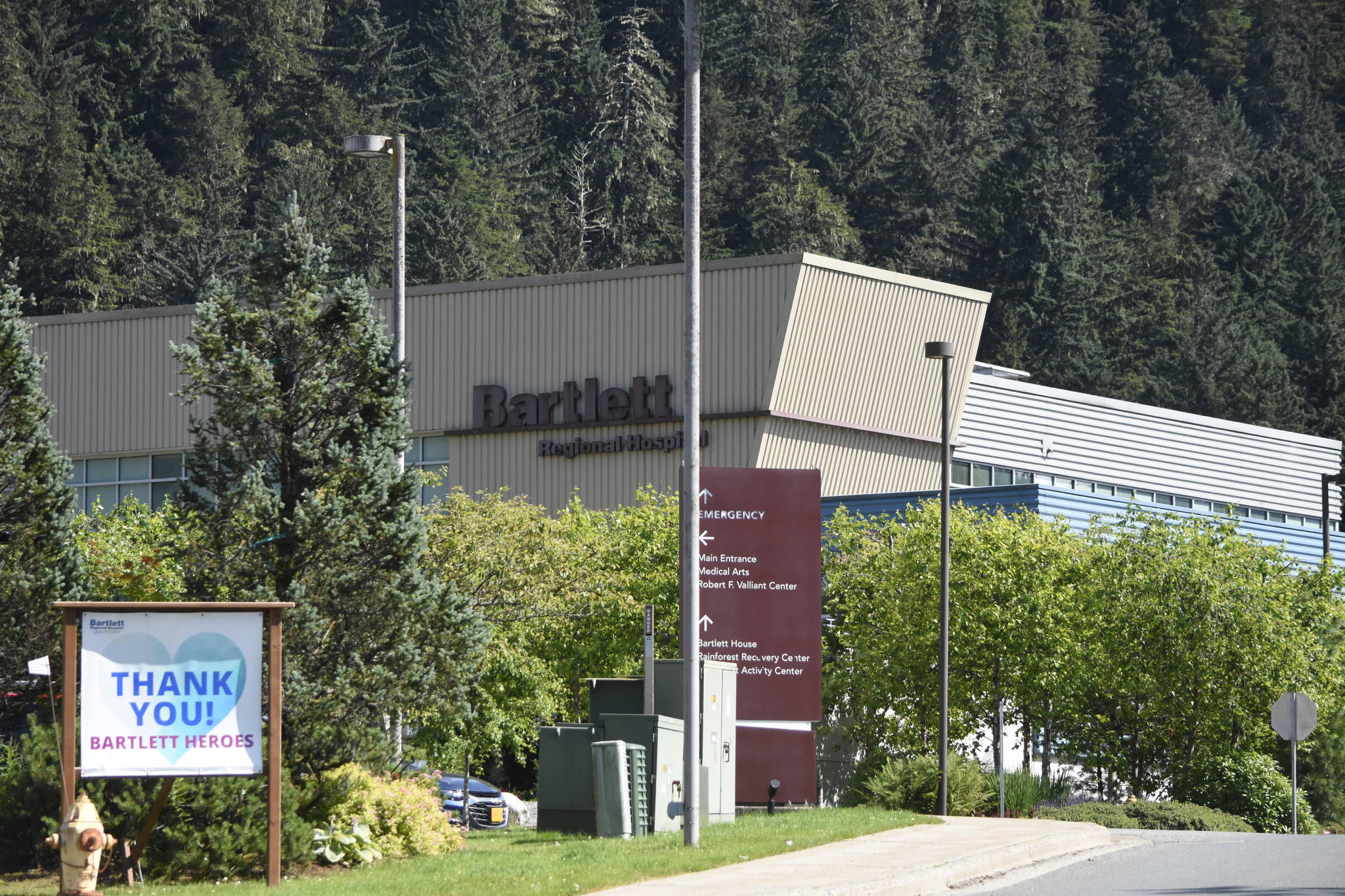Juneau’s health infrastructure is under strain but holding strong, local officials say. However, they say the rise in cases driven by the delta variant of COVID-19 is still concerning.
Despite the local and statewide increase in COVID-19 cases, local officials aren’t yet planning for increased mitigation measures, according to Deputy City Manager Robert Barr. In an interview with the Empire Tuesday, Barr said the city’s high rate of vaccination and relatively low number of hospitalizations have city leaders confident mitigation measures are working.
“We’re much more confident with the tools that are available to us,” Barr said. “The effectiveness of the vaccines is strong, we are seeing vaccines are incredibly effective at preventing severe infections.”
The city reported another 18 resident cases Tuesday, which was slightly lower than daily numbers over the past few days, Barr said. While people are being admitted to Bartlett Regional Hospital, patients were being discharged as well.
The majority of COVID-19 hospitalizations and deaths in Juneau since January were among unvaccinated people, Barr said, which mirrors trends seen statewide and nationally.
“What we see locally mirrors what you see in the national and statewide data in terms of hospitalization and death statistics,” Barr said. “Since January, 92% of hospitalizations and 94% of all deaths have been unvaccinated.”
Bartlett Regional Hospital is ready to provide services to Juneau residents, said CEO Rose Lawhorne, but the hospital is feeling the strain of roughly 18 months of a pandemic.
“Staff are feeling the strain,” Lawhorne said. “And now, they’re sending their kids to school, there’s a lot of stress around the unknown, a sense of uncertainty and anxiety.”
[City announces student clinics, shares where to get 3rd shot]
Hospital administration regularly held staff town halls, Lawhorne said, are trying to actively make sure staff’s needs were being met and have made additional mental health services available to staff. However, Lawhorne said at the beginning of the pandemic there was a greater supply of national resources, including health care workers, that has since been depleted.
Lawhorne said she and members of the Alaska State Hospital and Nursing Home Association recently met with Gov. Mike Dunleavy about additional measures to alleviate staffing shortages. The state has good stockpiles of supplies such as personal protective equipment Bartlett can and has accessed, Lawhorne said, but shortages of testing supplies nationally are concerning.
Breakthroughs and boosters
Vaccinated people are still contracting the virus, known as breakthrough cases, but recent studies from the Centers for Disease Control and Prevention show that while the efficacy of the vaccine at preventing contracting the disease decreases over time, the efficacy at preventing severe infection or hospitalization remains high. Federal health officials announced last week immunocompromised people should get another dose of the Moderna, Pfizer and Jansen vaccines while fully vaccinated people should receive a booster dose.
According to the CDC, a booster dose is another dose given to someone who built enough protection after the initial vaccination but the protection decreased over time. An additional dose is specifically for immunocompromised people who may not have been able to build up enough or any protection when they were first vaccinated, the CDC says. The CDC is recommending moderately to severely immunocompromised people consider receiving a third dose of an mRNA COVID-19 vaccine — such as the Pfizeror or Moderna vaccines— at least 28 days after the completion of the initial two-dose mRNA COVID-19 vaccine series.
Health officials recommend the general public who received a two-dose vaccine get a booster shot eight months after they completed their vaccine series.
The city is still developing its plans for administering booster shots to the general public, Barr said, but officials anticipate the process will be similar to the initial rollout with mass-vaccination clinics held at Centennial Hall. Officials are still awaiting additional guidance from federal authorities but initial recommendations have given Sept. 20, as the date distributions should begin, Barr said.
At an Aug. 19, news conference DHSS epidemiologist Matt Bobo made similar statements and said the state’s rollout of additional doses and boosters would likely be similar to the initial rollout.
According to Lawhorne, Bartlett had already begun offering an additional dose to its immunocompromised staff.
Barr said city officials were confident the current mitigation measures in place were effective when followed. The city regularly gives large gathering exemptions for weddings and religious congregations on the grounds they implement mitigation strategies.
“When those events employ masking well, it’s very rare for us to see spread,” Barr said, “especially among a population that are vaccinated.”
Barr said the city’s current mitigation measures, which include a mask mandate in publicly used buildings and areas, were the least intrusive ways for the city to try and contain the spread of COVID-19.
On Monday city officials announced separate vaccine clinics for students ages 12 and older and the immunocompromised in the coming weeks.
Lawhorne said Bartlett is trying to operate as normally as possible, but announced last week it was evaluating certain surgeries requiring an inpatient stay to see which could be delayed to keep the number of occupied beds to a minimum.
“We’re very aware of the impact that this could have and we’re trying to keep operating as normal as possible,” Lawhorne said. “We want the community we know we’re here to take care of the community whatever your needs are.”
• Contact reporter Peter Segall at psegall@juneauempire.com. Follow him on Twitter at @SegallJnuEmpire.

